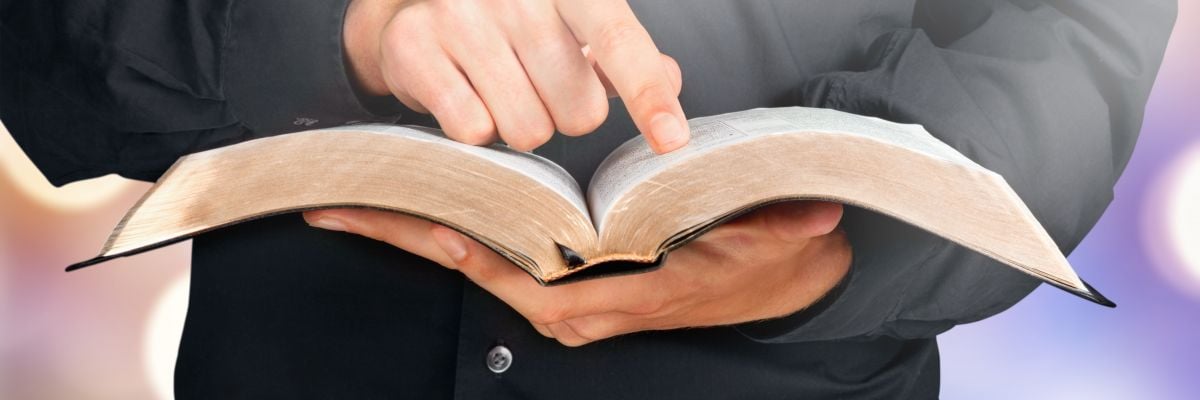
While not every exegetical argument can be settled with the citation of a verse, some can.
I often have received letters and e-mails from non-Catholics saying, “Put up or shut up. Where does the Bible mention anything about confession?” I quote John 20:22–23: “Whose sins you shall forgive they are forgiven them, whose sins you shall retain they are retained.” Of course, I don’t stop there. I draw the logical inference.
If a priest is to distinguish which sins are to be forgiven and which are not, he must be told what the sins are and must be able to determine whether the penitent is sorry for them. The only way a priest can learn a penitent’s sins is by being told them, and the only way he can weigh whether the penitent is repentant is to listen to and speak with the penitent.
I like to say that John 20:22–23 proves the validity of the confessional—not that “the box” existed in apostolic times, of course (it was a sixteenth-century development), but that auricular confession must be what is implied by the pair of verses, or they don’t imply anything at all.
Other issues don’t lend themselves to so convenient a resolution.
A Protestant, arguing for sola fide, may cite Romans 3:28: “For we hold that a man is justified by faith apart from the works of the law.” (Luther translated, “by faith alone.”) A Catholic will rejoin with James 2:24: “You see that a man is justified by works and not by faith alone.” To many, these verses seem contradictory.
Partisans of one verse often seem unaware that the other verse exists, but at some point most intelligent readers of the Bible realize that these verses are interrelated. To reconcile Romans 3:28 and James 2:24 takes no legerdemain, but it does take a deliberate effort to work through several chapters to get the sense of what is going on. In the end, Paul and James are seen to be writing in harmony.
Then there are issues that require even more work.
Consider Mary’s perpetual virginity. Both Protestants and Catholics too facilely focus on verses such as Matthew 13:55, which names four men—James, Joseph, Simon, and Jude—as “brothers of the Lord.” Protestants tend to say this settles the matter: if the men were our Lord’s brothers, they were Mary’s sons.
Defenders of Catholic teaching seem too satisfied to point out that Hebrew and Aramaic had no words for close relations such as cousins, so Matthew, writing from a Jewish background and using the diction with which he was familiar, would have used “brothers” to describe any close relations. Thus, these men would not have been Mary’s children but possibly her nephews.
Neither side wins by sticking to Matthew 13:55 alone. Mary’s perpetual virginity can be established from Scripture, but not by a consideration of any of the “brothers of the Lord” verses. If those verses were all we had, we’d have to take an agnostic position on the issue. (I prescind here from Catholics knowing the answer by means of infallible papal teaching; I’m referring only to what the Bible says.)
But those verses aren’t all we have. The exegete must don the detective’s cap and look at multiple verses. When this is done, he discovers that all the other relevant verses point in the same direction, toward Mary’s perpetual virginity. Here are some of them:
1. The James and Joseph mentioned in Matthew 13:55 are elsewhere (Matt. 27:56, John 19:25) said to be the sons of Mary the wife of Cleophas, not Mary the wife of Joseph. Cleophas and Joseph were different men, so these two Marys were different women. This means James and Joseph couldn’t be Jesus’ brothers german. When Matthew calls them “brothers of the Lord,” he must have in mind some wider usage of “brothers.”
(By the way, notice how many Marys appear in the New Testament: the Virgin Mary, Mary of Cleophas, Mary Magdalene, Mary of Bethany, and possibly one or two more. It is said that the name Mary was held by about one in five women in the Holy Land during our Lord’s time.)
2. From the cross Jesus gave his mother into John’s care, something he would not have done if Mary had other children who could take care of her. It would be strange for our Lord’s last command to be, in effect, a denial of the family relationship, if the “brothers of the Lord” were his brothers in the modern sense. He gave his mother into John’s care precisely because he had no brothers who could assume the duty.
3. The “brothers of the Lord” are never called sons of Mary, although Jesus regularly is called her son. If they also were her sons, why this odd construction? It is not a natural way for the Evangelists to write. You would think that at least one of the Evangelists would have called these men the “sons of Mary,” but not so.
4. John 7:3-4 reports, “His brothers said to him, ‘Leave here and go to Judea, so that your disciples may see the works you are doing. No one works in secret if he wants to be known publicly.’” They were giving him advice about his future. In ancient times, younger brothers never gave older brothers advice on how to live their lives. It was considered rude to do so. (This remains the custom in the Orient and in other parts of the world: younger siblings defer to older siblings.)
This suggests either that the “brothers,” if Mary’s children, were older than Jesus—not possible, since he was the first born—or that they weren’t his brothers at all but were more distant relations, whether older or younger, who would have felt free to give him advice.
5. Answering the angel, Mary asks, “How can this be since I know not man?” If she had been intending to have a “normal” marriage with Joseph, she would have had no need to ask how she would have a child. She would have expected to have children. As a country girl, she certainly knew how babies came about; she wasn’t asking about the mechanics of the thing. Her question makes sense only if she had taken a vow of lifelong virginity.
It may take work, but many doctrinal issues can be settled by recourse to nothing but Scripture. It’s too bad that many Catholics are gun shy about using the Bible to back up their beliefs.
They need to learn that using proof texts is not a sin.



